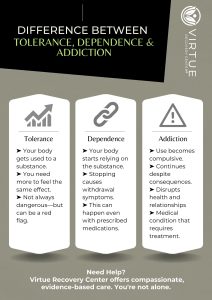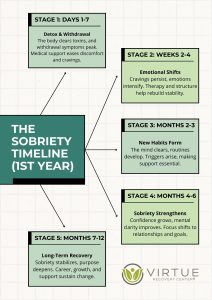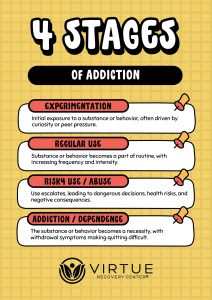Fentanyl is a synthetic opioid much more potent than morphine, commonly used to treat severe pain. However, recreational users often abuse fentanyl, leading to addiction. Fentanyl addiction is a serious problem that can have devastating consequences. Understanding the causes of fentanyl addiction is crucial to identifying those at risk and providing appropriate support.
At Virtue Recovery Las Vegas – Substance Use Disorders, our fentanyl addiction treatment program is designed to help individuals overcome their addiction and regain their lives. Contact us at 866.520.2861 to learn more about how we can help.
What Are the Causes of Fentanyl Addiction?
Fentanyl addiction has become a significant problem in the U.S., contributing greatly to the rising number of overdoses and deaths associated with substance use disorders. Fentanyl addiction causes various health problems for those who use the drug, including respiratory issues, heart attacks, and brain damage.
So, what are fentanyl addiction causes? Like other opioid addictions, fentanyl addiction can stem from many factors, such as:
- Genetics – Research has shown that genetics significantly determine a person’s susceptibility to addiction. Therefore, individuals with a family history of substance use disorders may be more likely to develop fentanyl addiction.
- Trauma – Traumatic experiences, such as physical or sexual abuse, can also lead to addiction. When individuals use fentanyl to mask emotional pain, it can quickly become a habit that turns into an addiction.
- Mental Health – Individuals with pre-existing mental health conditions, such as depression or anxiety, may use fentanyl to self-medicate.
- Environmental Factors – Environmental factors such as exposure to drugs, peer pressure, and availability of drugs can also increase the likelihood of developing addiction.
Symptoms of Fentanyl Addiction
Fentanyl addiction can have various symptoms that manifest uniquely in different individuals. The following are some common symptoms of fentanyl addiction:
- Strong Urges – Individuals with addiction experience strong physical and mental urges to consume the drug, which can lead to uncontrolled drug-seeking behavior.
- Physical Symptoms – Prolonged use of fentanyl can cause physical symptoms such as drowsiness, slurred speech, weakness, and confusion.
- Social Withdrawal – Addicted individuals often isolate themselves from social interactions and neglect their social responsibilities.
- Mood Swings – Fentanyl addiction can cause rapid mood swings, leading to irritability, anxiety, and depression.
How Can Virtue Recovery Las Vegas – Substance Use Disorders Help?
At Virtue Recovery Las Vegas – Substance Use Disorders, we provide comprehensive and evidence-based treatment for fentanyl addiction. Our specialized therapy and treatment programs aim to address the root causes of addiction and help individuals achieve long-term recovery.
Our multi-disciplinary team of medical professionals and addiction specialists works closely with each client to develop an individualized treatment plan. Our programs include over 50 hours of individual and group therapy, and we offer various levels of care, including outpatient and intensive outpatient programs.
Our experienced staff provides ongoing support to help clients address the underlying issues that have led to addiction. We do not believe in a one-size-fits-all approach, as each client is unique in their experience with addiction.
If you are experiencing symptoms of fentanyl addiction or know someone who is, we encourage you to contact us. We are here to help you start your journey toward a healthier and happier life.
Enroll in Fentanyl Addiction Treatment with Us Today
Fentanyl addiction is a serious problem with life-threatening consequences. Understanding the causes and symptoms of addiction is crucial to help identify the problem early on and seek professional help. Virtue Recovery Las Vegas – Substance Use Disorders provides compassionate and effective treatment for fentanyl addiction and other disorders.
Contact us through our web form or at 866.520.2861 to learn how our programs can help you or your loved ones reclaim their lives and achieve long-term recovery.













